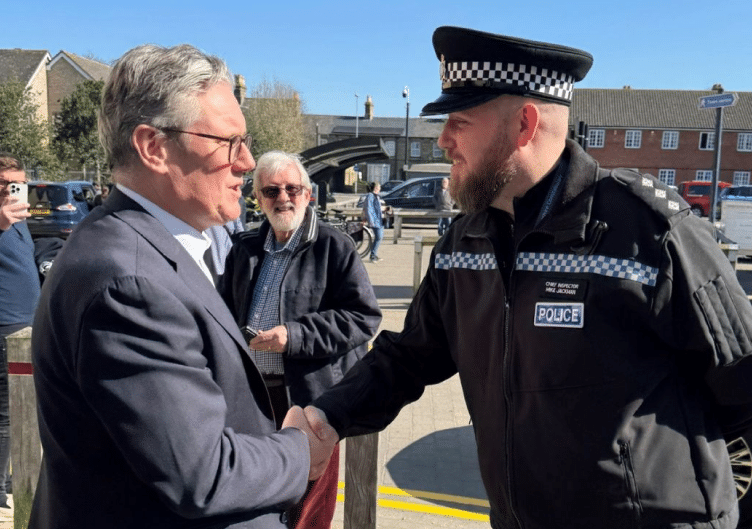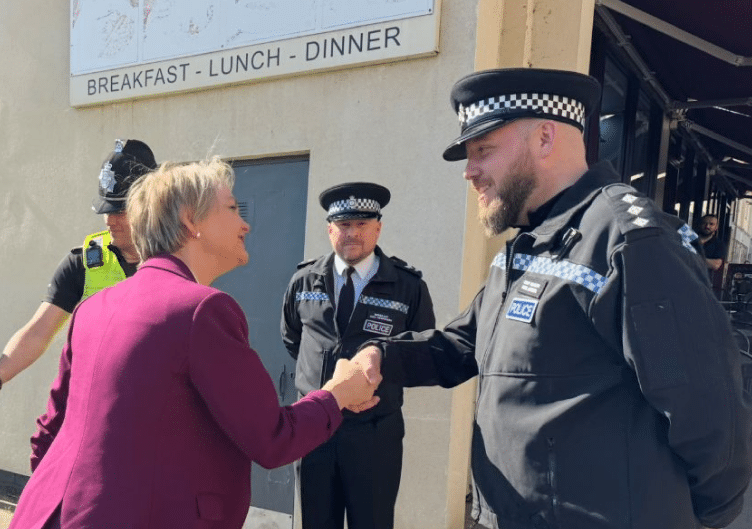
Mike Jackman meets Sir Keir Starmer. Image Credit: Cambridgeshire Police
A Cambridgeshire Police Federation member says a new Government community policing drive validates work already being done by the Force.
Prime Minister Sir Keir Starmer and Home Secretary Yvette Cooper visited the county to highlight the Neighbourhood Policing Guarantee.
They were welcomed to Force HQ by Chief Constable Nick Dean and travelled to Huntingdon police station and went on patrol with officers.
Neighbourhood policing Chief Inspector Mike Jackman was one of the officers to meet the cabinet ministers.
He said: “It was nice to have two cabinet ministers come to Cambridgeshire and speak to the officers.
“I’ve never met a prime minister before, but I shook his hand. Regardless of your politics, meeting a prime minister is something that you’ll never forget.
“It’s shining a light on policing and neighbourhood policing, which is great.”
The Prime Minister and Home Secretary used the visit to announce 3,000 more neighbourhood police officers and police community support officers in the next 12 months, 30 of whom will be with Cambridgeshire Police.
Every neighbourhood in England and Wales will have dedicated neighbourhood policing team, with guaranteed police patrols in hotspot areas at peak times.
Communities will also have a named, contactable officer to tackle issues.
And there will be a dedicated antisocial behaviour lead in every force, working with residents and businesses to develop action plans.
Mike said Cambridgeshire officers stood ready to deliver on the guarantee.
“Times have moved on, and policing has had to change and flex, but there are some elements of local community policing that should always be included, engagement and visibility are included in that.
“Great things are happening with local community policing in Cambridgeshire and I can safely say we have amazing teams filled with great officers, all of whom are ready to go.”
He said the Force was already doing a lot of what was announced by the Mr Starmer.
Mike, who has been an officer for 20 years, said: “Around 18 years ago, I was a neighbourhood policing constable in Peterborough.
“I’ve recently got back into neighbourhood policing when I was promoted to inspector in Peterborough, and I’ve sort of made it my mission to try to bring neighbourhood policing back to a more traditional style.
“More visibility, more face-to-face engagement with the public, and more community focused – like we used to do.
“For me, the Neighbourhood Policing Guarantee is a return to that style of policing.
“We can’t go back to how it used to be because things have moved on. Crime’s changed and problems in neighbourhoods are very different to what they used to be 18 years ago.
“This is bucking that trend, and this is why I really like it.
“I feel an affinity with it, because a lot of what has been put in the Neighbourhood Policing Guarantee I was driving anyway.
“Now I’ve got a little bit of a clout behind it, so things I was trying to introduce are now being mandated, which is really helpful.”
Mike said that in Cambridgeshire there is a clear effort to engage with people and communities and to identify their policing priorities.
“Every three months, each policing area selects three engagement priorities the public have said they want us to work on.
“Police officers tend to look at everything through the lens of threat, harm, and risk, not necessarily through fear of crime and quality of life.
“When we have limited resources and limited budgets, we do tend to put resources into maximizing the impact we can have on keeping people safe.
“The lower end stuff is really important people. So we say to people, you choose your three priorities and we will work on them.
“Where we have an engagement priority, we see a reduction in whatever the problem is over that quarter.
“The feedback from the public is that it really does improve their quality of life.”
He added: “With the Neighbourhood Policing Guarantee, we’re now going to refine that with a more traditional style of engagement with the public.
“We’ve embraced technology and are using online forms to gather information. But with the Neighbourhood Policing Guarantee we’re move to in-person, face-to-face meetings with the public.
“Come and see your policing team and tell us what your problems are.”
Mike said building relationships with communities and trust in the police was a vital part of policing.
“You’ve got this unwritten contract that we all need to maintain with the public based in the Peelian Principles, that the public are the police and the police are the public,” he said.
“But people are only going talk to us if they trust us.
“It’s almost so simple that it’s easy to forget. It’s not a nice to have the public onside, we need the public onside because we can’t tackle any form of criminality unless we’re getting that intelligence in and we don’t get the intelligence in unless they trust us.
“And then if we don’t provide the public with avenues to engage with us, they might trust us, but we’re not going to get that information.
“We need to put ourselves out there and we need to be available. That’s the policing guarantee.”
Mike said that neighbourhood policing was a unique role.
It could involve planning and holding engagement events, setting up community meetings, or arranging them for other teams.
“Neighbourhood police play crucial role in serious and organised crime, especially when you look at the clear, hold, build model of policing,” he said.
“This is where you’re looking to try and clear an area of criminality. Lots of enforcement work takes place, and neighbourhood policing is front and centre of that, gathering the intelligence and making arrests.
“But also in the hold phase, when we’re trying to prevent people from getting a foothold back in that community, it’s the yellow jackets on the street corners that are going make it a hostile environment for criminals to start operating again.
“Problem solving is the real bread and butter of neighbourhood policing, things that might not necessarily be criminal yet, but are antisocial behaviour on the cusp of criminality.
“Officers will apply problem solving models and methodologies, work with partners and stakeholders such local authorities, housing, community safety teams and community safety partnerships to get to the root cause of problems.
“A lot of what neighbourhood police officers do is really important but it’s difficult to hang it on a metric and say this is the result that you’ve had.
“For instance, you’d struggle to put a number on the crime you prevented, how many incidents you prevented, and how safe people feel.
“Maybe, to some degree, it’s sometimes why neighbourhood policing gets overlooked because it’s difficult to count our successes. You feel them more than count them.”


